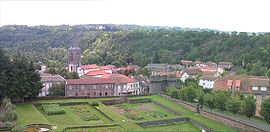Pontgibaud
Pontgibaud | |
|---|---|
 Panorama de Pontgibaud | |
| Coordinates: 45°49′59″N 2°51′04″E / 45.833°N 2.851°E | |
| Country | France |
| Region | Auvergne-Rhône-Alpes |
| Department | Puy-de-Dôme |
| Arrondissement | Riom |
| Canton | Saint-Ours |
| Government | |
| • Mayor (2020–2026) | Jean-Jacques Lassalas[1] |
Area 1 | 4.59 km2 (1.77 sq mi) |
| Population (2022)[2] | 715 |
| • Density | 160/km2 (400/sq mi) |
| Time zone | UTC+01:00 (CET) |
| • Summer (DST) | UTC+02:00 (CEST) |
| INSEE/Postal code | 63285 /63230 |
| Elevation | 639–779 m (2,096–2,556 ft) |
| 1 French Land Register data, which excludes lakes, ponds, glaciers > 1 km2 (0.386 sq mi or 247 acres) and river estuaries. | |
Pontgibaud (French pronunciation: [pɔ̃ʒibo]) is a commune in the Puy-de-Dôme department in Auvergne in central France.
It is located in the Massif Central region of France on the banks of the river Sioule. The area around the town was historically known for silver and lead mining. The Société des mines et fonderies de Pontgibaud exploited the lead-silver mines between 1852 and 1897.
The remnants of Château-Dauphin, a 12th-century castle, are located in Pontgibaud.
John Ruskin spent October 7, 1840 exploring Pontgibaud. He reckoned it "Altogether the happiest day, as far as employment or scenery can go, I have had for these long five years".[3]
Notable people
- Anna Garcin-Mayade, painter and member of the French Resistance
See also
References
- ^ "Répertoire national des élus: les maires" (in French). data.gouv.fr, Plateforme ouverte des données publiques françaises. 13 September 2022.
- ^ "Populations de référence 2022" (in French). The National Institute of Statistics and Economic Studies. 19 December 2024.
- ^ The Dairies of John Ruskin. Selected and edited by Joan Evans and John Howard Whitehouse. Vol 1. (1835 to 1847). Oxford at The Clarendon Press. 1956.




